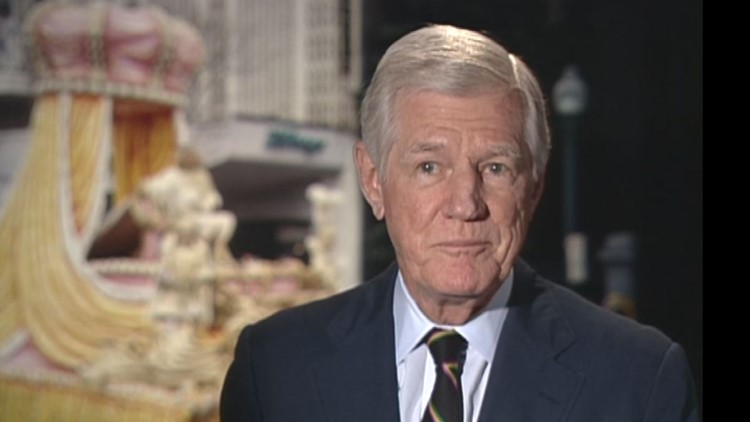Brooke Duncan II, a lawyer and civic leader who reigned as Rex, King of Carnival, in 1971 and served as captain of the Rex Organization when the parade was canceled by a police strike in 1979, died Monday. He was 95.
His death was first reported by The Times-Picayune/New Orleans Advocate. Duncan was the oldest former Rex, the newspaper reported.
Traditionally, the person who holds the position of Rex captain, like in other krewes, is not publicly identified. But Rex's prominence in Carnival history and as a major Fat Tuesday parade also brings its captain a more public role, as it did for Duncan during a challenging time.
He was the krewe’s leader in 1979, when the city’s police union went on strike over wage demands. The action came just before Carnival, threatening the parades and in essence holding the city’s organized parades hostage. As leader of one of the oldest and most prominent parades, Duncan played a pivotal role.
“The Tuesday before Mardi Gras, I called together everybody that had not paraded at that point and proposed that we just call it off,” Duncan said in a 1997 WYES-TV interview. “The theory being that you would remove the hostage. So that Tuesday before Mardi Gras, we had all the krewes there that were going to parade in Orleans Parish from then until Mardi Gras and they agreed to call it off.”
“It removed the hostage and in my opinion it broke the strike. At least they didn’t carry out what they had tried to do and I think the city was glad that we did it that way,” Duncan said in the WYES interview.
Although the parades did not roll (including three of the oldest: Rex, Comus and Proteus and Zulu), they did stage their Carnival balls.
"We knew at the time it would be a great disappointment to the public to cancel the parades, but there was never any question in my mind that we would continue to hold the festivities for the young women and men of the courts,” Duncan told The Times-Picayune in 2009. "It was something we had to do. No one nor any organization owns the magic that is Mardi Gras, and we had to set that precedent."
During Duncan’s tenure as captain, the Rex Organization celebrated its 100th anniversary. In 1971, the year he reigned as Rex, the krewe revived an old custom of having its "Monday king" arrive at the riverfront by boat on the day before Fat Tuesday. Rex only staged the riverfront arrival for that one year, however, before the custom went dormant again. It was then revived as Lundi Gras in 1987 and has since expanded into a major event.
Duncan was a New Orleans native whose father was the city’s first director of city planning. Duncan Plaza was one of his innovations and was later named for him.
According to the newspaper, Duncan was a graduate of Isidore Newman School who served as a fighter pilot in World War II’s Pacific Theater and rose to the rank of captain.
After the war, Duncan returned to New Orleans and earned a law degree at Tulane University. He managed several businesses, including Foster Awning Co. (owned by his late wife's family), and was on the boards of directors for Entergy, Hibernia National Bank and the National Association of Manufacturers.
Duncan also served on the boards of Tulane University, the Citywide Development Corp., New Orleans Charter Science and Mathematics High School, St. Martin’s Episcopal School, Metairie Park Country Day School, the Chamber of Commerce and the Metropolitan Area Committee.
Duncan’s wife, Kitty Foster Duncan, died in 2005. She was a key supporter and fundraiser for Audubon Zoo, among many other causes, and helped conceive its biggest annual fundraiser: Zoo-to-Do.
Survivors include three sons, a daughter and eight grandchildren.



